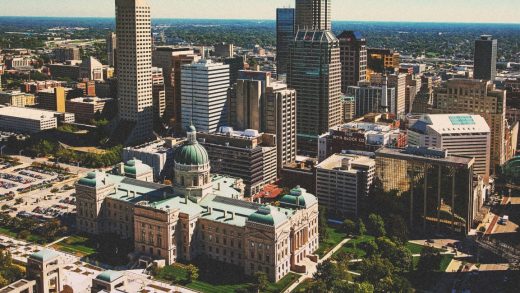What “middle-class” looks like in 4 U.S. cities
Since 2011, the share of middle-class Americans has reportedly inched up just 1%. Though many more people self-identify as middle-class, just over half of Americans would qualify based on their income. According to the Pew Research Center, 52% of American adults are in middle-class households as of 2016, with a median income of $78,442. For a family of three, a middle-class income can be anywhere between $45,195 and $135,585. While the size of the middle class hasn’t changed much in recent years, for the four decades prior, Pew reports that it fell steadily from 61% to 51%. And the middle class hasn’t seen gains in income comparable to those seen in upper income households.
Today, as housing and education costs balloon, many Americans are feeling the squeeze. Middle-class families in 2019 are far less secure in their ability to live comfortably while also buying a home, providing for their children, and saving for retirement. Of course a six-figure income (or close to it) means more in the Indianapolis metro area, where middle-income salaries for a three-person household range from $41,941 to $125,823, versus in New York, where the comparable income tier is $55,138 to $165,414.
We talked to four families across different metropolitan areas in the U.S. to learn how they live and work—and try to reach the markers of the middle class—with salaries of $100,000 or less.
Nikki Trojanowski, Indianapolis
Household income for family of four: $75,000-$90,000
I work freelance, so I never really know how much I’m going to make. Pretax, my husband and I make between $75,000 and $90,000. We own our home, and our mortgage is less than $1,500 a month. It’s a four-bedroom, 2,000-square-foot home, about 15 minutes south of downtown Indianapolis. You could not get anything downtown for what our house costs. When we bought our house, we didn’t have a large downpayment, so we’re paying more than we would be if we put 20% down. There are many houses smaller than ours in Indianapolis and many houses much bigger, so I would say when you define “middle class,” our house probably does that pretty well.
We do have a budget, but I wouldn’t say we have a strict budget. We try and make sure my husband’s salary covers all of our must-pay bills—the mortgage, insurance, groceries, utilities, and gas. We want his salary to pay for everything that we have to have. But it doesn’t allow us to save anything. That’s where my income comes into play. We try our best to save some of that. Of course, it doesn’t always happen. A lot of my income will go to, say, going out to dinner—the more optional lifestyle choices. I wish I could say, “We save this much per month,” but it would be a lie.
We have two kids, but we don’t have any childcare costs because I’m able to work part-time, which is mostly evenings and weekends. And my dad is retired, so he’s my childcare when I have daytime obligations. However, my oldest is going to start preschool next week, so we will have some childcare expenses. We don’t have any credit card debt, which is awesome, but we bought a car at the end of last year. So we have one car payment, and I have one student loan that I’m still paying off. I’ve just been slowly chipping away at it and only have a few thousand dollars left to pay off.
We don’t go out and blow our money. We think about big purchases, and even small ones to an extent. I would say it’s partially the fact that Indianapolis is a great place to live, and the cost of living is affordable. And the other half is the fact that we are really responsible with our money and intentional, thoughtful spenders.
My husband was laid off from two jobs back-to-back. That’s not a great position to be in, especially since his is the only regular income in our house. Even before that, we wanted to always have a savings account that would help us if that were to happen. Because Indianapolis is affordable, and it’s also a good job market, my husband was able to find other work. What could have been an incredibly stressful situation was only mildly stressful.
Everyone knows what they grow up with. We’ve always lived affordably and never in a bigger city than Indianapolis. We love our house, but now with two kids, we’re thinking about wanting to move in the next year or two to a house that has a little more space and is possibly in a better school district. We love Indianapolis. My family’s here, and my husband’s family is two hours away. But even if they weren’t, it’s a really great, livable city. You get a bit of the big city feel without the inconvenience of having to pay $50 to park anywhere you go, or having to spend a fortune to own a home.

Jason,* Pittsburgh
Household income for family of two: $85,000
I grew up here. I kind of branched out, but I kept coming back to Pittsburgh as a base. We were living in Salem, Massachusetts, until 2017. My company is completely remote, so I was able to give myself a raise by moving to an area with a lower cost of living.
Our household income right now is about $85,000, which I guess is probably on the lower end for most of the country. In Pittsburgh, it definitely stretches way further. There’s more of a cushion here for sure, and you can feel it. It relieves some of that anxiety. As much as I loved Boston and hope to return to New England someday, it was always tight there. At the end of the month, when it came time to put something aside, there was never anything to sock away for the future. I’ve been working for a couple decades now, so I already feel like I’m a little behind on savings. So the only way I could see to quit messing around and get to saving was to go someplace where the money stretched further.
I’ve lived sort of a [nomadic] lifestyle in terms of getting up and moving every couple years. I like to experience new cities and new places. I like to travel. So I didn’t have that desire for home ownership most of my life. But I’ve been renting my whole life, and I wanted to start investing in my own property. And not that I base my decisions on social media, but when you see people that you graduated with saying, “We paid off our mortgage,” and you’re still renting, it feels like, “Oh, I’m a little behind. Maybe I should grow up a little bit.”
That only became possible by going to a place where the cost of living was half. We were paying $1,600 a month in rent for a two-bedroom condo in Salem. But if we were going to purchase that particular condo or something comparable, it would have cost anywhere between $275,000 to $300,000 easily. In Pittsburgh, we were able to buy a house for under $150,000. So while I really prefer to live somewhere a little more walkable and hip and all that—it depends on what your priorities are, I guess.
I’ve actually turned down some offers over the years that would have put me in a better situation salary-wise. I didn’t want to pass up the flexibility that remote work gives me. I’ve worked in a lot of places and industries over the years. Now I can’t imagine getting back into that grind of commuting and sitting in a cubicle or office. My mental state is so much better when I’m in control of that aspect of my life. Plus, I’m a musician, and my band goes on the road quite a bit.
We now save about $200-$1,000 a month. My fiancée doesn’t let us go below a $200-$300 cushion. Most of our money goes to groceries, to be honest, but that’s because we’re vegans who go for organic everything. That hits your bank account. When there’s a little bit of money left over, some of it goes just to savings and some goes to investing. My fiancée is quite a bit younger than me, so I’m also thinking I’m going to be ready to retire around the time that she’s my age now. I don’t want to work forever, but I also know you can’t just take away one income and expect everything to be okay without some cushion.
I’ve gotten away from living on credit cards. That was the mistake I made early in life. I thought of credit cards as money, and when one got full, somebody else was offering me one. I totally fell into that trap. Next thing you know, I’m buried in debt—like the American dream gone awry. Now I try to just use credit cards for emergencies or maybe a vacation here and there—something I know I can pay down relatively quickly. That, in itself, is its own form of saving, by 2019 standards.

Chaniece Vaughns, Houston
Household income for family of three: $100,000
I don’t see us leaving Houston long-term. Houston is a huge city, and the opportunities are endless. My husband does have the opportunity to earn yearly bonuses and whatnot, but that just depends on how sales are in his business. For me, I’ve been in this range for a couple of years, and at this moment, at my particular job, I don’t foresee any opportunities to get a raise or bring in more income.
We have a lot of conversations about how we don’t give ourselves enough credit, or we’re just not grateful enough for what we have. We are able to pay our bills, put some in savings, and still do things as a family—whether that’s vacations traveling outside Houston or just activities here. I think we’re doing okay. I really do.
We have a mortgage, and our mortgage is about $1,500 a month. We bought our house in March of 2017, so it’s been a little over two years. We were in an apartment for a couple of years, which was about $1,100—really not that much of a difference. Prior to buying a home together, we kept our finances separate. Once we made a decision to buy a home, there was no other choice but to combine our finances.
I would say our budget is pretty strict, and I’m definitely the one who’s more aware of it. For me it’s as simple as: bills always come first. After bills, we try to set aside anywhere from $2,000 to $3,000 a month in savings. Whatever is left—that’s what we use for groceries and gas. But to me, those are fixed. I know exactly how much I’m going to spend on groceries and gas every two weeks. When something comes up unexpectedly—we just signed my son up for his soccer team, and that’s not something we pay for monthly—we have to dip into the savings. That’s why I’m so strict about putting that money aside, not just to have it sitting there for the sake of savings but because it really is used for a rainy day.
We are trying to have another child. So that’s a huge focus, to not only cover the costs of doctors’ appointments leading up to actually having the child but also getting our income to where it needs to be for when the child actually arrives. Day care is super expensive. Those are things that are constant sources of worry for us, but we’re confident that things will just work out. That’s just kind of how we operate.
This is where we struggle. We’re blessed and grateful for what we have. We’re able to do the things that we need and a lot of what we want. But can a child really fit into where we are financially right now? Should we be looking for new jobs? We’re both happy in our jobs, but financially we would need to be bringing in more to have another child. That’s just being honest and super realistic.
Those are conversations we’re having: how to bring in more income without killing ourselves. I do think the move for me is to find a job that pays more. But it’s not just about money. I had a really good corporate job making way more money and way better benefits, and I quit that to work for free so I could move into a field that I felt more passionately about. We’re big on quality of life. I know we’re living in a culture of grind and hustle, but I just don’t want to ever become so busy with work that I’m not able to spend time with family or pursue my hobbies.
As far as my son’s future, that’s something that is always at the back of my mind. There are only so many ways that you can split savings. I always feel like we could be doing more for him. I’m not saying we would necessarily pay for all four years of college. My parents didn’t, and I was able to get scholarships and grants. But we want to be able to help him out wherever we can. I take pride in what we’re able to provide for our son.

Kasey,* New York
Household income for family of four: $98,000
When people hear that you make close to $100,000, they think that means you’re living large. But really it doesn’t go as far as people think it does. I’ve been in New York since 2004. I have my main job—my nine-to-five—as a senior publicist for a PR company. And then I also have side jobs. I do PR for other people on the side and ghostwrite books for influencers and celebrities. When you add it all together, I make about $98,000, 80% of which is from my day job.
I was running my own company for the past seven years, and I felt like I was working just to pay rent. Literally every check was going toward paying rent and bills. The thing with working for yourself is sometimes it’s really good—you have really good clients who pay their invoices on time. But then you have times where there’s a lull, especially around the holidays. The last couple of years, that rat race of getting a check every month just became really, really stressful. I wanted to have the security of a consistent paycheck, so I just transitioned over into the corporate space working for a larger company. Now my side hustles are just supplementing my income. I feel like I have the ability to live a little.
When you’re a freelancer or working for yourself, retirement is the elephant in the room. You know it’s something that’s eventually going to come, and you should be preparing for it, but you don’t know how. Every dollar you get is going to something else. Retirement? 401(k)? What’s that? So it’s different now that I have a full-time job. I can breathe a little bit.
Before I moved, I had an emotional breakdown and was hospitalized. That’s what prompted my exodus from the city. I had lost a client, which had put me behind on my rent. My landlord was harassing me. I was completely overwhelmed, not knowing where I was going to get money from. I thought I was going to get evicted. The city, as amazing as it is, can be very unforgiving.
I used to rent in the city in Washington Heights and Harlem. I paid $2,800 in rent. My electricity bill was sky high. I ate out more and took cabs. I even had to budget for my weekly parking tickets. When I broke up with my daughters’ father and didn’t have his income coming in to help pay those bills, it became more of a strain. It was easier to move for co-parenting—he lives in White Plains now—and because I could get more for my money. I’m literally a block away from the Bronx and about 25 minutes from Harlem. My rent is $2,500, and I have three bedrooms; I even have a dining room and living room.
My son goes to boarding school in Connecticut, but he’s on a full scholarship. I have joint custody of my two daughters with their father, and he’s very active in terms of helping and paying for things. We go half on almost everything. So it’s probably not as burdensome as it is for other single mothers. I have a good supportive system around me. Our biggest costs are after-school care and extracurricular activities. I’ve always worked from home, so I have flexibility that a lot of parents wouldn’t have.
I don’t even know what a savings account is—I’ve never even used the savings side of my bank account. My goal to live comfortably is earning $150,000 a year. At what I’m bringing in right now, I’m not where I would be if I lived in, say, Atlanta. And the type of industry I work in—I have to go out and network and be around people. I’m spending on cabs and dinners. What I have to do to continue to make money costs me money. Until I make $150,000 a year, I feel like I’m never really going to be able to save.
*Only first names have been used to protect anonymity.
(22)



